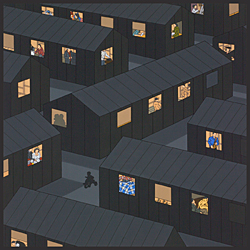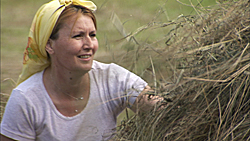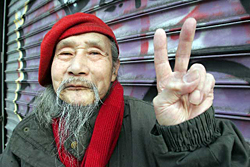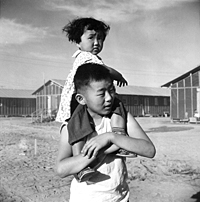Ethnic profiling is illegal in the United States, prohibited by the Fourth Amendment, which requires probable cause for searches and seizures, and by the Fourteenth Amendment, which calls for equal protection under the law.
And yet, as the recent arrest of Harvard scholar Henry Louis Gates demonstrates, the issue remains far from settled. Indeed, recent statistics compiled by the state of Missouri show that black drivers are 67% more likely to be pulled over than white drivers. In the wake of 9/11, a Cornell University poll found that almost half of Americans believe government should restrict the civil rights of Muslims. And this spring a report from the American Civil Liberties Union argued that U.S. authorities detain thousands of people each year solely “on the basis of religion, race or nationality.”

This fall Washington University in St. Louis will present a semester-long series exploring the history, impact and ethical issues surrounding ethnic profiling. “Ethnic Profiling: A Challenge to Democracy” will include lectures, debates and panel discussions as well as workshops, performances and film screenings.
“‘A Challenge to Democracy’ will draw upon academic researchers from philosophy, political sciences, history, law, social science, business, medicine and other disciplines,” explains Stuart D. Yoak,Ph.D., executive director officer of the Center for the Study of Ethics & Human Values, which organized the series.
“The series will demonstrate the power of approaching a complex ethical topic — involving both scholarly and practical concerns — from an multidisciplinary perspective,” Yoak adds. “Included will be experts and professionals in public policy, law enforcement and national security charged with the practical application of values concerning ethnic profiling.”
“A Challenge to Democracy” takes its name from a World War II propaganda film defending the U.S. government’s forcible internment of approximately 120,000 Japanese Americans. Though upheld by an infamous Supreme Court ruling — Korematsu v. United States (1944) — the internments later were judged by a 1983 congressional report to have been “not militarily necessary” and motivated by “anti-Japanese agitation [that] fed on racial stereotypes and fears.”
Several events will deal specifically with the internments. In August the Freshman Reading Program — which aims to provide incoming students with a common intellectual experience – will center on Julie Otsuka’s novel When the Emperor Was Divine, which explores the effects of internment on one Japanese American family. Otsuka will then speak about her work Sept. 15 as part of the university’s Assembly Series. Meanwhile the Performing Arts Deparment in Arts & Sciences will host “Dancing Who I Am,” a panel discussion and dance concert exploring the role of ethnicity in dance, Sept. 12. Participants will include critic Elizabeth Zimmer, former dance editor of The Village Voice; and Thomas DeFrantz, a professor of music and theater arts at MIT.
On Oct. 2 Michael Adams and Gyo Obata will discuss how internment impacted their respective families. Obata, a cofounder of HOK, the world-wide architecture firm based in St. Louis, is the son of noted California painter Chiura Obata. During the war the Obata family was sent to the Topaz War Relocation Center in central Utah, but Gyo — like many other Japanese students — was able avoid internment by continuing his education at Washington University, where he enrolled at the School of Architecture.
Michael Adams, also a Washington University alumnus, is son of famed photographer Ansel Adams. In the 1930s Ansel and his wife, Virginia, sold work by Chiura Obata through their Yosemite gallery, Best’s Studio. In 1943 Ansel — departing from his signature landscape images — created a series of photographs documenting life in California’s Manzanar War Relocation Center, which he published the following year as a book, Born Free and Equal.
Immediately following the talk, the Mildred Lane Kemper Art Museum will open a Teaching Gallery exhibition titled A Challenge to Democracy: Ethnic Profiling of Japanese Americans During World War II. Jointly curated by Angela Miller, professor of Art History & Archaeology in Arts & Sciences, and graduate students Elissa Weichbrodt and Anna Warbelow, the exhibit will explore the pervasive nature of ethnic profiling through a variety of visual records and materials, ranging from books and magazines to a sampling of photographs by Ansel Adams and paintings by Chiura Obata.
Chiura’s art also serves as a backdrop for Dust Storm: Art and Survival in a Time of Paranoia, a one-man play about the camps written by Rick Foster and performed by Zac Drake Oct. 3 and 4. On Oct. 12 Celebrated painter Roger Y. Shimomura, who spent the war in the camps with his family, will discuss how the experience shaped his work for the Sam Fox School of Design & Visual Arts. Other events will include concerts, poetry readings and theatrical performances as well as discussions of ethnic profiling in dance, fashion, law, philosophy and other fields.
All events are free and open to the public. For updates, a complete schedule or more information, call (314) 935-9358 or visit humanvalues.wustl.edu.
For directions to the events and parking, please see the campus map.
SCHEDULE OF EVENTS
7 p.m. August 24 Freshman Reading Program Washington University’s incoming freshman class will participate in campus-wide discussions centering on When the Emperor Was Divine, Julie Otsuka’s novel of a Japanese American family forced to live in a World War II internment camp.
11:30 a.m. September 10 Book Discussion When the Emperor Was Divine University City Public Library A community book discussion centering on the novel by Julie Otsuka and led by led by Henry Biggs, associate dean of the College of Arts & Sciences and director of Undergraduate Research.
8 p.m. September 12 Panel Discussion and Dance Concert “Dancing Who I Am” Edison Theatre A panel discussion and dance concert exploring the role of ethnicity in dance. Participants will include critic Elizabeth Zimmer, former dance editor of The Village Voice; Thomas DeFrantz, a professor of music and theater arts at MIT, who specializes in African American performance; and postdoctoral fellow Ting-Ting Chang, who studies contemporary dance development in China, Taiwan and Hong Kong.
3:30 p.m. September 15 Assembly Series Lecture Julie Otsuka Graham Chapel The author of When the Emperor Was Divine discusses her work.
7 p.m. September 17 Panel Discussion “Did the Japanese American Internment Violate Constitutional Rights… and Why Do We Care?” Danforth University Center, Room 242 Randall Calvert, the Thomas F. Eagleton University Professor of Public Affairs and Political Science, will moderate a discussion with panelists John Haley, the William R. Orthwein Distinguished Professor of Law; Denise Lieberman, lecturer in Political Science; and Wendy Roll, president of the Japanese American Citizens League, St. Louis Chapter.

5 p.m. October 1 Film Screening A Powerful Noise (2008) Danforth University Center, Room 276 Hanh is an HIV-positive widow in Vietnam. Nada is a survivor of the Bosnian war. And Jacqueline works the slums of Bamako, Mali. Directed by Tom Capello, this affecting documentary tells the stories of three women from vastly different worlds who overcome significant gender barriers to rise up and claim a voice in their societies. Panel discussion to immediately follow, moderated by Mary Ann Dzuback, associate professor of education and director of the Women, Gender and Sexuality Studies Program.
6 p.m. October 2 Panel Discussion Michael Adams and Gyo Obata “Remembering the Internment: A Conversation by the Son’s of Chiura Obata and Ansel Adams” Steinberg Auditorium Gyo Obata and Michael Adams will discuss the impact of the internment of Japanese Americans on their respective families. Chancellor Mark Wrighton will introduce the discussion.
7 to 9 p.m. October 2 Exhibition Opening A Challenge to Democracy: Ethnic Profiling of Japanese Americans During World War II Teaching Gallery, Mildred Lane Kemper Art Museum Curated by Angela Miller, professor of Art History & Archaeology in Arts & Sciences, this intimate exhibition will explore the internment of Japanese Americans and the pervasive nature of racial profiling. Included will be a variety of visual records and historical materials, from vintage books and magazines to a selection of photographs by Ansel Adams and several paintings by Chiura Obata.
8 p.m. October 3 4 p.m. October 4 Performance Dust Storm: Art and Survival in a Time of Paranoia Steinberg Auditorium The art of Chiura Obata serves as background to Rick Foster’s one-man play, performed by Zac Drake, about survival during a time of xenophobia.
2 p.m. October 4 Lecture “The Art and Life of Chiura Obata” Kimi Kodani Hill Steinberg Auditorium Hill, the granddaughter of Chiura Obata, will discuss Obata’s the art and life, including his life in the internment camp.
7 p.m. October 5 Lecture “Sharing Personal Accounts of the U.S. Japanese Internment Campus during World War II” Location TBA Robin Hattori, program director for the Gephardt Institute for Public Service, moderates a series of first-person accounts by citizens who were interred in the camps. Participants will include Janice Koizumi, a California native who was interned in Rohwer, Arkansas, with her family and later at Tule Lake, California, with her husband. A reception will immediately follow.
7 p.m. October 8 Panel Discussion “Security Based Ethnic Profiling” Umrath Hall A panel of faculty and law enforcement experts will address the issue of security-based ethnic profiling in the St. Louis area and the United States. Participants include Kathleen Clark, professor in Washington University’s School of Law; Kevin Johnson, dean of law at the University of California Davis; and Margaret Chon, the Donald and Lynda Horowitz Professor for the Pursuit of Justice at Seattle University and author of a recent article titled “Walking While Muslim.”
6 p.m. October 9 Homer G. Phillips Public Health Lecture Eric P. Newman Education Center, Medical School Campus Harriet Washington, author of Medical Apartheid: The Dark History of Medical Experimentation on Black Americans from Colonial Times to the Present, will discuss St. Louis’ now-defunct Homer G. Phillips Hospital, built in the 1930s to serve African Americans. Panel discussion to immediately follow.
6 p.m. October 12 Lecture Roger Y. Shimomura, “An American Diary” Steinberg Auditorium Shimomura is a celebrated painter and faculty member at the University of Kansas. During World War II his family was forced into a Japanese interment camp, an experience that shape his art and lead him to explore issues of culture, discrimination and ethnic stereotypes. Today his work can be found in the Whitney Museum of American Art, the Smithsonian Museum of American History and other major collections.
6 p.m. October 16 Lecture Aram A. Schvey “The Children Left Behind” Schvey teaches international human rights at Georgetown Law School and is serving as a Fellow in the International Women’s Human Rights Clinic. His presentation on anti-Roma discrimination focuses on his work on educational segregation of Roma children.
2 p.m. October 18 Film Screening Adio Kerida (Farewell My Love) (2002) St. Louis Holocaust Museum This bittersweet documentary follows distinguished anthropologist Ruth Behar as she returns to her native Cuba — which she let as a child — to profile the island’s remaining Sephardic Jews. At the same time, Behar also chronicles the experience of her own family as Cuban-Jewish exiles in the United States. Rabbi James Stone Goodmen will introduce the film. * Presented by the St. Louis Holocaust Museum
7 p.m. October 19 Concert and Poetry Reading Jason Hill and musicians from the Saint Louis Symphony Orchestra Holmes Lounge Hill, a medical student at Washington University, will read original poems on the topic of ethnic profiling while musicians from the Saint Louis Symphony Orchestra will perform works relating to the issue of ethnic profiling.
6 p.m. October 21 Panel Discussion “The Way People Dress: Clothing and Ethnic Profiling” Ann W. Olin Women’s Building Bonnie Kruger, Senior Lecturer and Costume Director, Performing Arts Department, is organizing a fashion show depicting ethnic profiling followed by a Faculty-Student Panel Discussion. Speakers: John Bowen, James Singleton, Bonnie Kruger
7 p.m. October 22 Performance Saint Louis Symphony Orchestra A Child of Our Time Powell Symphony Hall A dramatic oratorio written by Michael Tippett that explores “man’s inhumanity to man.” Preconcert lecture by David Robertson for students attending concert. * Presented by the Saint Louis Symphony Orchestra

7 p.m. October 29 Film Screening The Cats of Mirikitani (2006) Danforth University Center, Room 276 Directed by Linda Hattendorf, The Cats of Mirikitani tells the story of Jimmy Tsutomu Mirikitani, and 80-year-old homeless artist who was traumatized by his internment during World War II. An intimate exploration of the lingering wounds of war and the healing powers of friendship and art, this documentary won the Audience Award at its premiere in the 2006 Tribeca Film Festival.
7 p.m. November 5 Panel Discussion “Racial Profiling: Beyond “Pro” and “Con” Ann W. Olin Women’s Building Kit Wellmon, professor of philosophy in Arts & Sciences, moderates a discussion in which faculty panelists will present arguments both defending and opposing the moral permissibility of ethnic profiling. Participants will include Andrew Rehfeld, assistant professor of political science in Arts & Sciences, and Frederick Schauer, the David and Mary Harrison Distinguished Professor of Law at the University of Virginia.
7 p.m. November 16 Panel Discussion “Policing Black Activism” Missouri History Museum This program will use selections from the film Eyes on the Prize II followed by a faculty panel discussion with local black activists to discuss ethnic profiling. Professor Elsa Barkley Brown, U. of Maryland Department of History, will introduce film and moderate the panel discussion. * Presented by the Missouri History Museum

6:30 p.m. November 19 Film Screening Passing Poston: An American Story (2008) George Warren Brown School of Social Work Directed by Joe Fox, this documentary explores connections between the Japanese Americans who were interred at the Poston War Relocation Center in Arizona and the Colorado River Indian tribe, whose desert reservation hosted the camp.
November 12-22 18th Annual St. Louis International Film Festival Dates and Times TBA In conjunction with “A Challenge to Democracy,” the Cinema St. Louis will present a special Ethnic Profiling Sidebar Program, which will showcase a series of films focusing on ethnic and racial profiling, as part of its 18th Annual St. Louis International Film Festival. For dates, times and prices, visit the Cinema St. Louis website.